Regulation & Bitcoin
> Bitcoin Intégration
Bitcoin Financial Regulation: Securities, Derivatives, Prediction Markets, & Gambling by Jerry Brito, Houman B. Shadab, Andrea Castillo. Jerry Brito George Mason University - Mercatus Center Houman B.
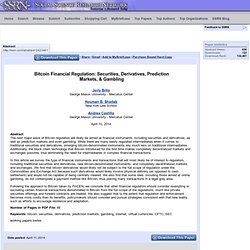
Shadab New York Law School Andrea Castillo. Germany recognizes Bitcoin as a “private money,” subject to capital gains tax. In response to a query by a member of parliament, the German Finance Ministry has declared (Google Translate) that it accepts bitcoins as a “unit of account.”

The Ministry added that bitcoins are a sort of “private money” and that mining bitcoins constitutes “private money creation.” The Ministry also clarified that if a German taxpayer holds bitcoins for more than a year, she is exempt from paying the 25 percent capital gains tax. Such a tax would ordinarily be paid after profiting from the sale of a stock, bond, or other security. However, taxpayers are now required to pay taxes on any profits made from Bitcoin transactions that happen within a year. How would the Finance Ministry even know if a taxpayer holds bitcoins? The German lawmaker, Frank Schäffler—a member of the Free Democratic Party (FDP), a pro-business, center-right party—wrote on Twitter that famed Austrian economist Friedrich Hayek would be happy with this decision.
In Germany, You Can Now Make Private Transactions In Bitcoins. The federal government of Germany, one of the most important nations in the financial world, has recognized Bitcoins officially.

The financial regulator in the country has added the currency to the national banking code after deciding Bitcoins actually do act as "units of value.
" The digital currency is now recognized as "private money" and thus can be trusted to a degree by bodies like banks. Coindesk.com quotes Stefan Greiner, a German lawyer, as saying the move makes Germany "the first country in the world which has a clear cut set of rules applicable to Bitcoins.
"
Federal judge: Bitcoin, “a currency,” can be regulated under American law. Bitcoin lobbyists meet US authorities amid growing scrutiny of digital currency. Representatives of Bitcoin's largest lobby group met federal law enforcement and financial agencies on Monday as the US authorities increased their scrutiny of the controversial digital currency.
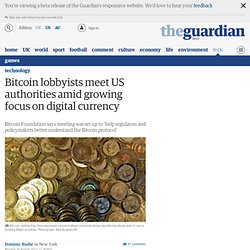
Patrick Murck, general counsel for the Bitcoin Foundation, confirmed the group was meeting the Federal Reserve, FBI, Treasury Department, tax officials and members of the secret service among others. Unlike traditional currencies, Bitcoin is not backed by a central government, but instead created by a computer program. It can be traded or used to buy goods and services. Authorities have expressed concerns about potential money laundering abuses and its use in funding illegal activities including drug purchases.
"Bitcoin and distributed finance is here to stay and our preferred path forward is a co-operative one, where we all can help ease each other's transition into an inclusive and distributed global financial system.
"
La devise virtuelle Bitcoin dans le collimateur des autorités. Les monnaies virtuelles régulées par le DATA. L'une des choses notable concernant cette cryptodevise est qu'elle a su attirer les autorités de régulation à s'intéresser de près à elle, mais pas que.
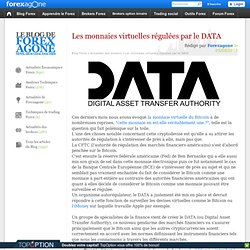
La CFTC (l’autorité de régulation des marchés financiers américains) s’est d’abord penchée sur le Bitcoin. C'est ensuite la réserve fédérale américaine (Fed) de Ben Bernanke qui a elle aussi mis son grain de sel dans cette monnaie électronique puis ce fut notamment le cas de la Banque Centrale Européenne (BCE) de s'intéresser de près au sujet et qui ne semblait pas vraiment enchantée du fait de considérer le Bitcoin comme une monnaie à part entière au contraire des autorités financières américaines qui ont quant à elles décidé de considérer le Bitcoin comme une monnaie pouvant être surveillée et régulée.
Bitcoin et regulation des monnaies virtuelles. Les Bitcoins d'un dealer saisis par la police. C'est à notre connaissance une première, qui confirme que les BitCoins sont désormais considérés comme une valeur monétaire qui n'a plus rien de virtuelle par les autorités publiques.
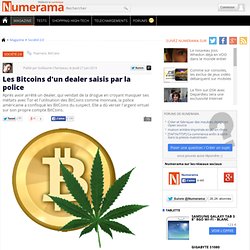
La fondation Bitcoin dans le radar de la justice Californienne. The Federal Reserve Is Officially Studying The Risks Of Bitcoin. FIN-2013-G001. To download Adobe Acrobat Reader, download PowerPoint Viewer or download Excel Viewer, please visit Accessibility page.
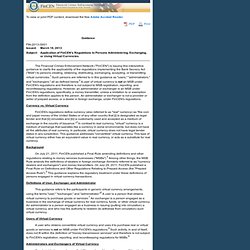
Guidance The Financial Crimes Enforcement Network ("FinCEN") is issuing this interpretive guidance to clarify the applicability of the regulations implementing the Bank Secrecy Act ("BSA") to persons creating, obtaining, distributing, exchanging, accepting, or transmitting virtual currencies.1 Such persons are referred to in this guidance as "users," "administrators," and "exchangers," all as defined below.2 A user of virtual currency is not an MSB under FinCEN's regulations and therefore is not subject to MSB registration, reporting, and recordkeeping regulations.
Mt. Gox accused of violating US money transfer regulations. The seizure of funds of the largest bitcoin exchange, Mt.
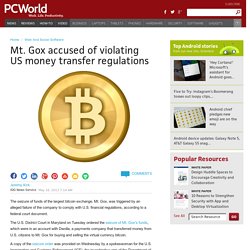
Gox, was triggered by an alleged failure of the company to comply with U.S. financial regulations, according to a federal court document. The U.S. District Court in Maryland on Tuesday ordered the seizure of Mt.
Financial Crime Enforcement Network (FinCEN) New guidelines on legal status of Bitcoin / nation’s money Laundering laws. The War On Bitcoin—and Anonymity. In a sign of the times, FinCEN, the US Treasury Department agency in charge of combatting money laundering, issued guidance on Monday on the regulatory status of Bitcoin users and exchanges.
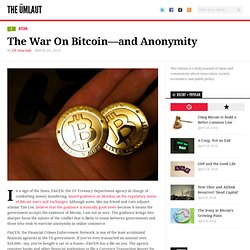
Although some, like my friend and Cato adjunct scholar Tim Lee, believe that the guidance is basically good news because it means the government accepts the existence of Bitcoin, I am not so sure. The guidance brings into sharper focus the nature of the conflict that is likely to ensue between governments and those who wish to exercise anonymity in online commerce.
FinCEN, the Financial Crimes Enforcement Network, is one of the least scrutinized financial agencies in the US government.









